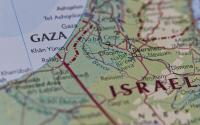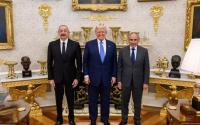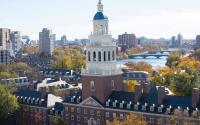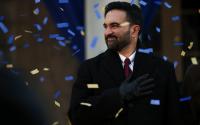Sylvie SimmonsSeptember 18, 2003
He always did know how to make an entrance. Dressed all in black - black shirt, black trousers, black shoes and socks, the odd black strand still visible in his oddly white hair - he sat, staring straight ahead through half-blind eyes, dignified and proud, at the window of the steel box he dubbed his "Popemobile", which slowly glided down the wall into the kitchen.
Its door opened to reveal a man in a wheelchair, looking much older than his 71 years. Life had not been kind to him since we last spoke eight months earlier. Stripped of much of the physical bulk that had always made him appear to be carved out of rock, more Mount Rushmore than man, he was frail but utterly commanding. The deus ex machina held out his hand and said - exactly as he did, at the start of every concert - "Hello, I'm Johnny Cash". As if it could be anyone else.
Less than six weeks ago I was with Johnny Cash at his house in Hendersonville, Tennessee, some 20 miles outside Nashville, down the winding road that led from Johnny Cash Parkway to the edge of Old Hickory Lake. It was then only a matter of weeks after June Carter, Cash's wife since 1968, had died of complications following heart surgery.
His only way of dealing with a pain he called "so severe I don't have the words to even start to describe it" was to devote what time and energy he had left to his music. Since he was a child, he said, music had always got him "through the dark times", and he was trusting that, "with the grace of God", it would do so again.
Here, in his home studio - in this beautiful, rambling house crammed with the ornate, dark-wood furniture and antique knick-knacks that June, who Cash said "had a black belt in shopping", loved to buy - he was working hard recording songs for a new album.
It was to be the fifth in the series of remarkable records he had made in the past 10 years with Rick Rubin, the eccentric, bearded producer who built the label American on the back of his success with hip-hop and heavy metal bands like the Beastie Boys and Slayer.
All of the Rubin/Cash albums were Grammy winners. More than that, they gave Cash, as American writer Nick Tosches put it, "the imprimatur of ageless cool". Where most veteran country artists spent their last years consigned to the blue-rinse country fair circuit, the Man in Black's status with the youth/rock/alternative market had shot to an all-time high - higher even than at the end of the 1960s, when he was inviting counter-culture rockstar guests like Neil Young and Joni Mitchell on to his primetime country music TV series, topping the charts with the first of his two seminal outlaw albums recorded live in US penitentiaries before an audience of prisoners, and duetting with Bob Dylan on Dylan's Nashville Skyline album. Taking Dylan fishing too, out on his boat on Hickory Lake. There's a space now by the jetty where it was always moored.
Since American Recordings in 1994, Cash has had Kate Moss star alongside him in a video, Nick Cave duet with him on record, and artists from right across the musical spectrum - from Merle Haggard to LL Cool J, Tom Petty to the Red Hot Chili Peppers - drop by the studio to play or pay their respects. From being hailed as a pioneer of country rock, Cash was now being called the Godfather of Gangsta Rap. He laughed at the idea but admitted that this new acclaim, following a decade in the commercial wilderness, had felt "very, very good".
To mark their first 10 years as collaborators - and he was at great pains to emphasise the word "first" - Rubin was putting together a box set of unreleased Johnny Cash material from the mountain of tapes in their vaults. Cash had decided to add an entire album of spirituals - his mother's favourite hymns - sung alone, in the back room of the house, with just a guitar as accompaniment. Rubin had asked me to write a book to go with the albums (tentatively titled Unearthed and due out before the end of this year). Which was why I was in Hendersonville, doing an interview with Johnny Cash that would last five extraordinary days.
We would start early each day after breakfast, which would always begin with a blessing and a prayer; "June always did it this way", said Cash, and he had no intention of changing the tradition. And we would talk until his voice, weakened by the regular bouts of pneumonia he has suffered in recent years, one of many unpleasant results of the Parkinson's-like autonomic neuropathy he was diagnosed as suffering from, gave out.
Then he would take a nap (a trick, he said, that he learned from his friend the Reverend Billy Graham) to renew his strength and head for the studio to record as many songs as he could until his voice gave out again.
In the years since bad health had forced him to give up touring, Cash had adopted a new timetable in which late nights played no part. "I go to bed with the chickens," he chuckled, "and I beat them to getting up."
If the summer weather wasn't too hot and humid, we would sit outside and talk among the flowers and the trees hung with bird-feeders. "I love to hear the birds sing in the mornings," he said. "It feels like they're singing to me."
Other times we might go to the small room where he kept his favourite books, or the round, wood-ceilinged room at the end of the house where boar's head and stuffed fish and other old hunting trophies lined the walls.
In the middle of that room he still kept the circular bed where he slept when he first moved into the house in 1967. The same bed on which he spent weeks kicking a serious addiction to amphetamines and alcohol, alone but for visits from a doctor, a preacher and June Carter. A few months later, declaring that he had found "a chance to find a little peace within myself", Cash married June in March 1968.
They met, he told me, in 1956 and it was love at first sight. He had heard her before he'd ever set eyes on her, he said - through the radio his parents had bought mail-order from the Sears Roebuck catalogue. As a young boy in Arkansas, he would be glued to the radio as he heard the pre-pubescent June sing and play Autoharp with her sisters and the Carter Family. Her mother was Maybelle Carter, whose pioneering guitar style was an enormous influence on his own.
"The first time I met June was backstage at the Grand Ole Opry, and I got on my knees and told her that I was going to marry her some day. We were both married to someone else at the time. Ring of Fire - June wrote that song for me, because that's the way our love affair was. We fell madly in love and worked together all the time" - June had been touring with Cash since the early 1960s - "and when the tour was over and we had to go home to other people, it hurt."
Pain had always been a part of Cash's life. As a child, picking cotton from dawn to dusk at his father's New Deal farm in Arkansas, he recalled aching from head to toe and comforting himself by singing all the songs he'd heard - gospel, blues, hillbilly; even now he still remembered the words to thousands of them.
When he was 11 years old he tasted his first "mood-altering drug" - when he broke his ribs, his father hitched the mules to their wagon and took him to the hospital, where he was shot full of morphine. He thought to himself, "I'll have some more of that some time." The following year he experienced a far, far worse kind of pain when his brother and best friend, Jack, died in a gruesome farming accident.
In the 1950s, after his first big hits on the late Sam Phillips' Sun label, the pain would be self-inflicted, as Cash acquired a taste for the amphetamines that helped solve the problems of gruelling tours and the shyness he never got over. The "Hello, I'm Johnny Cash" announcement was about the only way he could come up with to deal with meeting strangers - especially when the sociable June was not around to do it for him.
A period of extreme self-destructive behaviour in the 1960s resulted in an additional addiction to painkillers. He had broken his jawbone and several fingers (neither too sensible an idea for a singer-guitar player) - 20 bones in all, including the toe he shattered when trying to kick out the bars of one of the number of prison cells he spent the night in (for his own protection more than anything else). The number of cars he trashed would have brought tears to the eyes of any modern-day rebel rock star. After driving his jeep into a tree, he did the same with June's Cadillac, before driving a tractor over a cliff. "Indestructible?" he said. "I don't know about that. I guess I'm just lucky. It's nice that God thinks enough of you to save you."
Even when, with June's help, he found God, some part of that angry, renegade side of Cash remained - the Johnny Cash who struggled against authority, took the side of the underdog, refused to take anything lying down.
If it was no longer the same kind of death-wish that informed his earlier years, it was without doubt a disregard for the state of his physical well-being. Witness the time when, at the end of the 1980s, he got so mad at a belligerent ostrich in the exotic animal park he used to have behind The House of Cash (his former museum, now office) that he took it on in a fight and ended up with his stomach and chest ripped open and five ribs mashed. But as always, he lived to fight another day.
When we talked about his variousoperations and health issues two years back, Cash had laughed: "You would think death would be bored with me by now." This time, with the wound of his wife's passing still raw, he was more circumspect.
"Isn't life full of passion and woe?" he said to me as we sat and looked out over the empty lake. "It always has been. It's just a different kind of pain when you get older. More physical, less spiritual, pain." His religious faith, he said, was what kept him going - literally what had kept him alive - after June had gone. That and the music, into which all the anger and passion and helplessness and sheer brute force of will was channeled.
"God had other plans for me. I guess there's something more he's got for me to do, and who am I to argue?" His voice trailed off and he stared ahead, quietly for a while. Until I asked him if he was angry with God for being left to do it on his own. He sat upright in his wheelchair. "Never. Never!" His dark eyes blazed. Then he smiled. " My arms", he said "are too short to box with God."
http://www.guardian.co.uk/arts/fridayreview/story/0,12102,1044605,00.html






